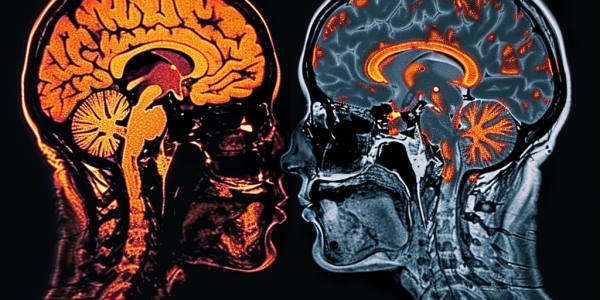Perceived Age of Dementia Caregivers and its Impact on Well-Being
Recent research from the University of Surrey reveals the impact of perceived age on dementia caregivers and individuals with dementia. Understanding how felt age influences well-being is crucial for improving caregiving relationships and overall quality of life.
Study Shows Hearing Aids May Slow Brain Aging Process in Adults with Mild Cognitive Impairment
Recent research from the University of California, Los Angeles, suggests that hearing aids could slow down brain aging in adults with mild cognitive impairment. A study using 18F-FDG scans revealed that untreated hearing loss may lead to below-normal brain metabolism levels in frontal cortical regions, potentially linking hearing loss to cognitive decline. However, individuals using hearing aids did not experience significant decline, indicating a possible role of hearing aids in preserving brain function and slowing cognitive impairment progression. This study, published in the Journal of Nuclear Medicine, highlights the importance of addressing hearing loss in individuals with mild cognitive impairment to support overall brain health.
Groundbreaking Dementia Prediction Method Discovered by International Research Team
Groundbreaking research led by Queen Mary University of London has developed a new method to predict dementia up to nine years before diagnosis with over 80% accuracy. By analyzing changes in the brain’s ‘default mode network’ using fMRI scans, this innovative approach could revolutionize dementia treatment by allowing for earlier interventions and personalized healthcare strategies.
Alzheimer’s Research Paper Retracted Due to Image Manipulation Allegations
A landmark Alzheimer’s disease research paper published in Nature in 2006 is being retracted due to allegations of image manipulation. University of Minnesota (UMN) Twin Cities neuroscientist Karen Ashe, the senior author of the study, has acknowledged that the paper contains doctored images. The retraction raises questions about the trustworthiness of researchers in the scientific community and underscores the need for rigorous oversight and scrutiny in scientific publications to maintain credibility.
Promising Results in Improving Alzheimer’s Symptoms Through Lifestyle Changes
Recent research has shown promising results in improving Alzheimer’s symptoms through lifestyle changes. A study published in Alzheimer’s Research and Therapy revealed cognitive improvement in individuals with mild cognitive impairment or early dementia. Participants like Tammy Maida and Mike Carver regained cognitive abilities through the intervention, offering hope for those affected by Alzheimer’s disease.
Understanding Dementia: Challenges and Strategies for Care
Learn about the prevalence of dementia globally and the importance of early intervention and supportive strategies. Dr. Sameer Gupta emphasizes the significance of understanding dementia as a neurocognitive disorder and highlights key indicators for timely intervention. With over 55 million people living with dementia, raising awareness and promoting early detection are crucial for improving the lives of those affected.
Remarkable Improvement in Brain Health of Alzheimer’s Patient
Discover the astonishing improvement in brain health of a patient battling early signs of Alzheimer’s disease. Learn how lifestyle changes, not medication, played a key role in transforming the brain biomarkers of Simon Nicholls. Find out how his proactive approach to health management offers hope for those with genetic predispositions to Alzheimer’s.
Link Between Traumatic Life Events and Alzheimer’s Risk
Recent studies suggest a potential link between traumatic life events and the risk of developing Alzheimer’s disease. Individuals who experienced stress at a young age may be more susceptible to Alzheimer’s later in life, as observed through higher levels of Alzheimer’s-associated proteins in spinal fluid samples. Despite ongoing research efforts, the exact cause of Alzheimer’s remains unclear, with genetic factors and protein production in the brain being common markers. Analyzing spinal fluid for these proteins could serve as an effective diagnostic tool, as shown in recent studies from Columbia University and Spain. The study published in the Annals of Neurology highlights the significance of stressful life events in contributing to Alzheimer’s development.
New Biomarker miR-519a-3p Discovered for Asymptomatic Stages of Alzheimer’s Disease
Researchers have discovered a new biomarker, miR-519a-3p, that could be used for early diagnosis and treatment of Alzheimer’s disease in its asymptomatic stages. This microRNA is associated with the cellular prion protein and could enhance diagnostic accuracy in the early stages of the disease. Join our webinar to learn more about the role of organoids in advancing treatment for neurological disorders.
Study Finds Junk Food Can Have Permanent Effect on Teens’ Brain
Recent study reveals that consuming a diet high in junk food can lead to long-term damage to adolescent brains, affecting memory and cognitive function. Researchers emphasize the importance of maintaining a healthy diet for teenagers to prevent lasting consequences well into adulthood.










